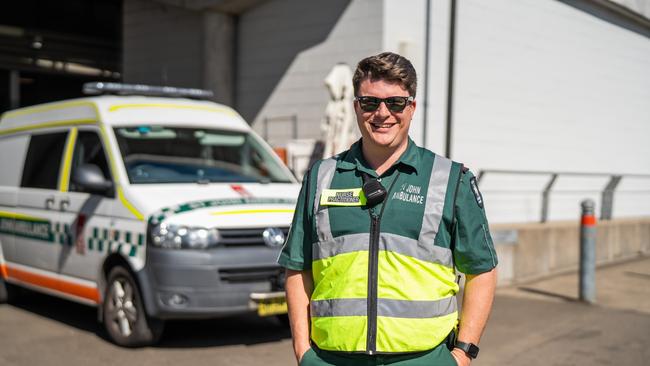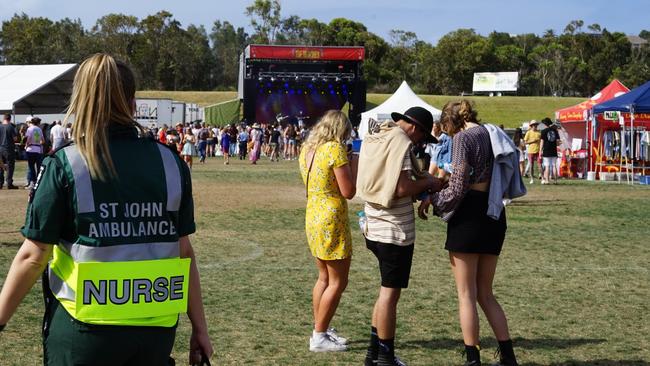The St John Ambulance volunteers saving lives at music festivals
At every music festival, there is a small army of medical volunteers waiting to help those whose fun has been cut short. From nurses to experienced doctors, they operate a safe haven in the middle of the party.
Police & Courts
Don't miss out on the headlines from Police & Courts. Followed categories will be added to My News.
Elliot Williams remembers well the day a music festival almost turned deadly for a young fan. Mr Williams — now the St John NSW deputy commissioner — said the teenager was bought in over heating and blacking out. The experienced medico says it was the “hallmark symptoms” of an MDMA overdose.
Mr Williams was working in the medical tent at one of the 50-plus festivals he has attended and he knew what to look for.
“(He) presented with a high temperature and reduced level of consciousness,” Mr Williams said.
“This person needed to be actively cooled and placed in an induced coma before being transported to hospital by ambulance.”

Without the immediate help of St John volunteers like Mr Williams, the situation could have been very different.
As many as 40,000 people will pack into the Yours and Owls festival this weekend, while hundreds of thousands more will attend the line-up of summer music festivals that follow – and many of them will require medical help.
At each festival that rolls around, there is a small army of medical volunteers waiting to help those whose fun has been cut short.
From nurses to experienced doctors, they are the first to arrive and the last to leave, operating a safe haven in the middle of parks and fields. Whether it be heat stroke, sprained ankles, blisters, sunburn or drug overdoses – volunteers from St John Ambulance are the first to help out and at times provide lifesaving treatment while paramedics rush to the scene.
This weekend, volunteers from St John will attend the Yours and Owls Festival in Wollongong – the 4778th event they’ve attended since June last year.

And, while the St John tents may look basic from the outside, inside are mini makeshift emergency departments, equipped to deal with a whole range of illnesses and emergencies.
Behind the plastic tent wall, staff are equipped to deliver critical care, like giving someone a general anaesthetic and placing them on a mechanical ventilator, performing blood tests or keeping someone anaesthetised with specialised infusion devices and monitoring equipment.
Just like a real hospital, there are different treatment areas, ranging from a triage area and waiting room, resuscitation bays, acute beds, subacute areas and treatment areas for things like suturing wounds or applying temporary plaster casts.
At each music festival, St John volunteers are ready and waiting to provide medical care, treating more than 16,000 people at a range of events in the past 12 months.
Of those 16,000, 1088 were transported to hospital for further care and treatment.
According to Mr Williams, the top three types of presentations to the medical tents relate to drug and alcohol complications, heat exposure and soft tissue injuries. In recent weeks, there have been several instances of overdose or drug complications linked to music festivals – with three men dying following Sydney events in the past 12 months. Despite the tragic deaths, Mr Williams said in his years of festival experience, there is a better understanding about alcohol and drug management.
“I remember seeing patients with intoxication or severe illness due to alcohol and other drugs at music festivals 10 years ago,” he said.
“There is a better understanding today among the event health services industry about what is needed from a medical provider to keep patients safe.”

St John NSW Deputy Commissioner Marian Casey agreed, noting that there were “better resources” available these days, and that people were well aware of when and where to find help.
“We are part of the experience of the day and being a friendly face makes a big difference,” she said.
“Our volunteers care about the safety of our community and understand the importance of our high level of training for these high acuity events.”
St John volunteers follow strict guidelines set out by NSW Health when it comes to festivals, with event organisers ordered to have medical assistance available at all times.
Under the guidelines, the level of medical care is dependent on the type of festival and the nature of past presentations. According to the guidelines, NSW festivals that recorded serious drug related harms in 2018-19 were associated with a demographic of 18 to 29 years, had an attendance of more than 8000 and offered “high energy or electronic dance style music”.
Despite each of the recent deaths being linked to electronic and hard-style festivals, the state government has refused to introduce pill testing, which was recommended by the state coroner following a spate of festival drug deaths in 2019.
Last week, Health Minister Ryan Park warned that pill testing couldn’t be viewed as a “silver bullet” for making illicit drugs safer.
“What I don‘t want people to believe is that one thing – pill testing, for example – is going to be a silver bullet that will prevent overdoses that will prevent deaths,” he said.
However, Mr Park said he would discuss with NSW chief health officer Dr Kerry Chant about the upcoming festival season to make sure measures to reduce harm are “as robust as possible”.
Got a news tip? Email weekendtele@news.com.au





